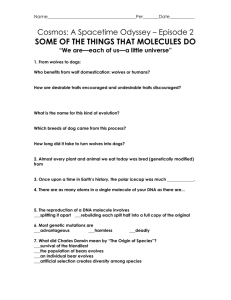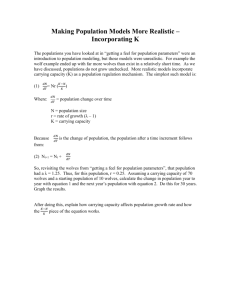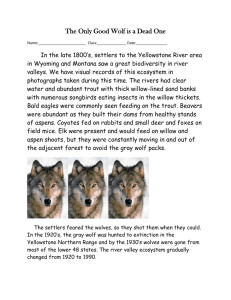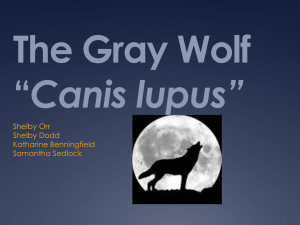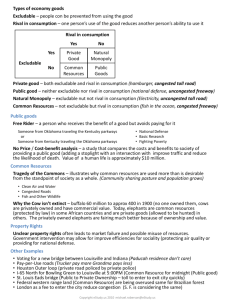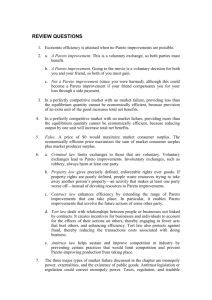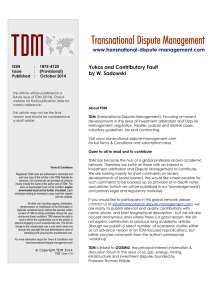Markets and Market Failure
advertisement
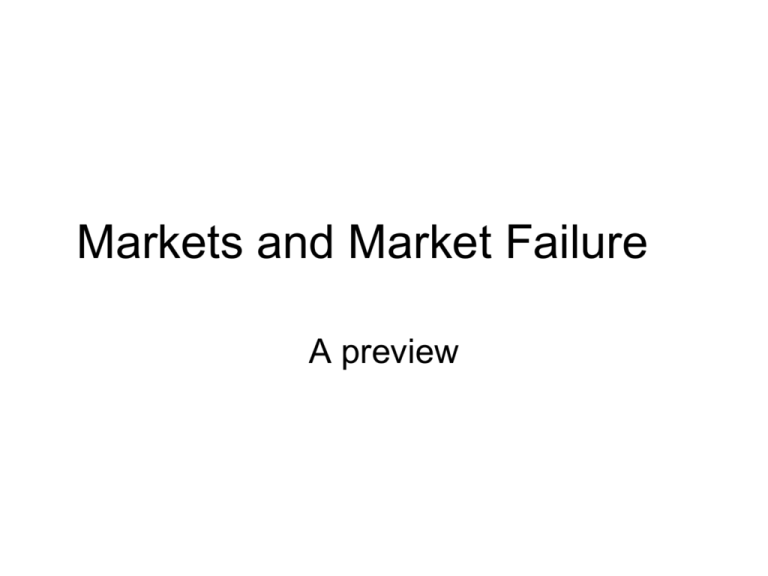
Markets and Market Failure A preview A Story • Wolves – Until 1985 we paid to shoot them. – Good for nature—already more growth in Yellowstone from suppression of herbivores. – Bad for ranchers • Worry sheep. Worry mothers. – How to increase wolf numbers? • Create a market in wolf damage • Bailey wolf comp fund paid 161,000 for 429 sheep in 2008. – Ranchers are paid– happy – Environmentalists get wolves and have to pay— happy Terminology • Utility-a person’s well being • Goods-anything, tangible or not, that can change a persons well being. • Services-intangible goods • Environmental services. Goods provided by the environment itself-clean air/water-wolves keeping the herbivores out of streams so fish can live. • Existence services-I get utility just from the fact that there are wolves. We (economists) love this story • It is a market solution to a thorny issue. We love markets. And market based initiatives. • In our telling everybody is better off. We are always looking for ways to make everyone better off. This is a key concept for us. Pareto Improvement • When at least one party to a deal is made better off and no parties are made worse off the deal is Pareto improving. • Examples of market trades that are pareto improving • Examples of market trades that are NOT pareto improving Could producer and consumer both be made better off by producing more? S D Q Markets • Lead to an equilibrium where there are no more pareto improving trades. – This is a theorem which we will partially prove much later in the course. What Goes Wrong With Markets • Reasons for – No ownership – Externalities – Public Goods – Insufficient weight on future – Government Failure Ownership • If you don’t own it you can’t sell it. – Open access (anyone can fish) – Water rights are hard to trade (once not legal) – Government seizure of property – Lack of enforcement—can’t use land as collateral in some places because government won’t/can’t enforce contract. Fishing for chocolate • Two bags of chocolates will be sacrificed in front of your eyes. • What do you think happens when teachers play this game? – Investment bankers – Great White Sharks – Actual fishermen Appropriative Water Rights • Are first in use, first in right. • Require Beneficial Use • Water is worth about $1/m3 in a city and $0.1-0.3 in agriculture. – Should water move to a city in a drought? – How come it doesn’t move? Legal? Physical? Yukos • Russia expropriates oil company.. • 4/29/09 St Petersburg Times • • Last week, the Stockholm Court of Arbitration agreed to hear a complaint by several Spanish investment funds demanding compensation from Russia for losses caused by the government’s forced Yukos bankruptcy. The official sum they are seeking has not been disclosed, but the Covington & Burling legal firm representing the plaintiffs has said more than $10 billion has been lost. This sum only covers investors who held Yukos securities and who live in countries that have bilateral agreements with Russia covering the protection of investments. Meanwhile, there is a much larger legal claim dating back to 2005, although few people know about this lawsuit because both sides have tried to keep it under wraps. In this case, former Yukos investors are the plaintiffs and Russia is the defendant, and the damages being sought are up to $100 billion. • Would YOU invest in Russia? Would/Could You Invest? • "Land is a common property of the Nations, Nationalities and peoples of Ethiopia and shall not be subject to sale or other means of exchange" (Sub Article 3). Sub Article 4 also states that "Ethiopian peasants have the right to obtain land without payment and the protection against eviction from their possession." Another important provision regarding property rights (Sub Article 7) states that "Every Ethiopian shall have the full right to the immovable property he builds and to the permanent improvements he brings about on the land by his labor or capital. This right shall include the right to alienate, to bequeath, and, where the right of use expires, to remove his property, transfer his title, or claim compensation for it.“ • Could a farmer get a mortgage and use it to buy equipment/oxen/anything? Externality Defined • An Externality is a non-pecuniary effect (of a transaction) that is borne by someone(s) other than the buyer or the seller. – Pecuniary effects are those effects that happen through changed prices. e.g. I buy more chocolate (shift my demand) and the price goes up – Non-pecuniary effects. E.g. I drive and emit exhaust. Externalities • Electric Power causes pollution • Buyer of power doesn’t suffer from the pollution (it is in the four corners and the wind blows from the west) • Buyer and seller happy. • Third party (external to the trade) not happy • Not pareto improving Wolves • • • • I keep wolves on my park. Wolves eat neighbors sheep. That’s external—I didn’t pay for the sheep. Good guys set up a fund to pay for the sheep. • Not externality any more—now a market transaction. We buy sheep for wolf food. • Story told better in text. Public Goods • Goods are not diminished by use are not rival. • Goods that you can be stopped from consuming are excludable. • Private goods are rival and excludable. – Think candy bar. • Public goods are non-rival and nonexcludable • Free Riders enjoy public goods without paying for them. Free riding can occur in other situations too. • Imperfect public goods. Partially but not wholly diminished by use. Another person in a class. Pay TV is a club good • Not Rival – My watching doesn’t interfere with your watching • Excludable – Gotta pay or you don’t get the signal. Open Access • Is rival – If I catch the fish you don’t • Is not excludable Public goods are underprovided. – Consider two people, both willing to pay $4 for one unit and $3 per unit for two units. – Good costs $4 to make – First person pays $4 and buys one unit. – Both now have one unit. – Neither will buy a second unit cause it costs $4 and they will only pay $3. – Suppose they work together? – Willingness to pay is found from Vertical Addition for Public good 2D 4 D 1 2 Future • Some say that we “weight” future generations too little in our decisions. • Look at the Hetch Hetchy story in the text. • Was it that the people in 1900 didn’t care about we 2010ers or was it that the people who did it didn’t care about anyone’s appreciation of the natural environment. • Don’t know. Stern Report • http://www.hm-treasury.gov.uk/independent_reviews/stern_review_economics_climate_change/sternreview_index.cfm • How bad is global warming? – Happens in the future – At 1% discount rate, one should take expensive action now to avoid further climate change. Nick Stern takes this view – At a 4% discount rate, why worry? Others take this point of view. Government Failure • Pays off special interests who help get them elected (or keep them in power by other means) at the expense of others. – US ag policy includes both payments to farm states and the food stamp program. • Often environmentally destructive, as in dams, prestige projects like airbus, and so on.
